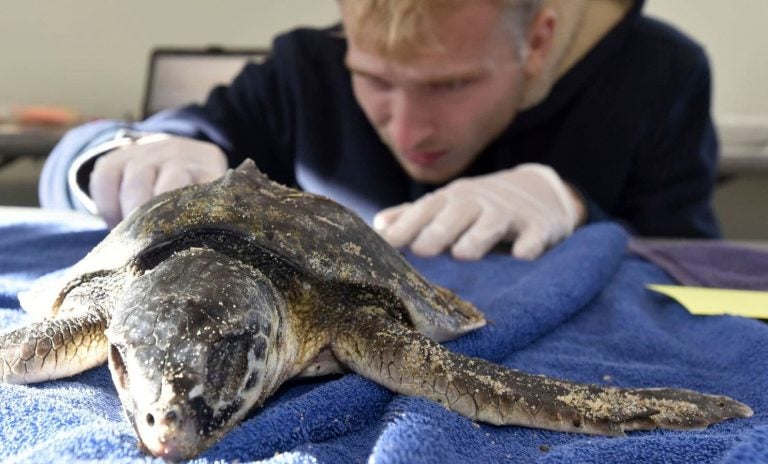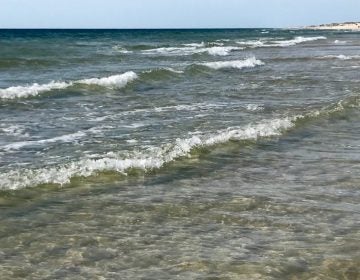Marine experts say to keep an eye out for ‘cold-stunned’ sea turtles on N.J. beaches

In this Friday, Nov. 23, 2018 photo, Ben Thyng does an exam of a newly arrived living Kemp’s ridley turtle to the ICU at the Audubon Society’s Wellfleet Bay Wildlife Sanctuary in Wellfleet, Mass., as cold stunned turtles are brought in off area beaches after several days of below freezing weather. Mass Audubon Director Bob Prescott believes a warming trend in the Gulf of Maine has allowed the turtles to delay migration south. (Steve Heaslip/The Cape Cod Times via AP) (Associated Press)
The cold snap around Thanksgiving that dropped ocean temperatures is putting migrating sea turtles at risk of washing ashore on New Jersey beaches as either “cold-stunned” or dead, wildlife experts say.
The nonprofit Marine Mammal Stranding Center in Atlantic County’s Brigantine says they’ve received reports of what appears to be frozen sea turtles along New Jersey beaches.
But Bob Schoelkopf, who operates the center along with his wife, Sheila Dean, says the sea turtles may appear to be frozen but that doesn’t mean they’re dead.
The cold-blooded animals, suited for water temperatures between 75 and 85 degrees, are susceptible of becoming stunned in cold water as they migrate south before winter sets in.
A frozen turtle was recently found on Long Beach Island, and the center is urging beachcombers to contact them if any sea turtles, which may appear dead, are spotted so that experts can respond and provide emergency care.
The center, which relies on donations to operate, is encouraging residents to walk the beaches to collect trash and keep an eye out for any sea turtles.
Dean recommends the following:
- Check the wrack line (the line of debris and seaweed left by the tide) for any turtles or litter that may be buried within it.
- Do not attempt to warm a turtle up or move it, as you may end up doing more harm than good.
- Save the center’s number (609-266-0538) and call even if you think the turtle is dead. Staff will provide further instructions.
Marine mammal rescuers found around 190 frozen sea turtles in Cape Cod, Massachusetts last week after a sudden swing from mild to frigid air temperatures causing water temperatures to plummet.
WHYY is your source for fact-based, in-depth journalism and information. As a nonprofit organization, we rely on financial support from readers like you. Please give today.




